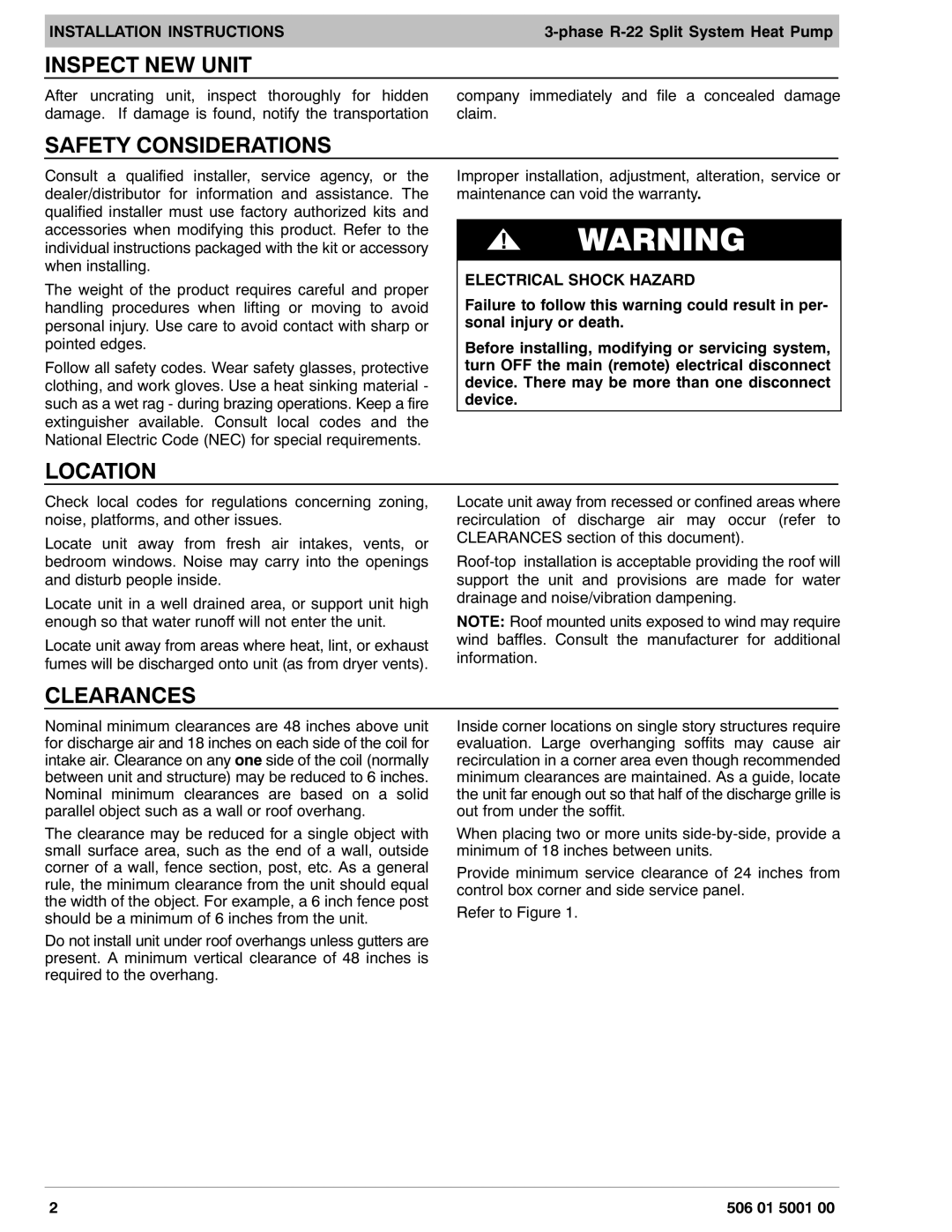
INSTALLATION INSTRUCTIONS | |
|
|
INSPECT NEW UNIT
After uncrating unit, inspect thoroughly for hidden damage. If damage is found, notify the transportation
company immediately and file a concealed damage claim.
SAFETY CONSIDERATIONS
Consult a qualified installer, service agency, or the dealer/distributor for information and assistance. The qualified installer must use factory authorized kits and accessories when modifying this product. Refer to the individual instructions packaged with the kit or accessory when installing.
The weight of the product requires careful and proper handling procedures when lifting or moving to avoid personal injury. Use care to avoid contact with sharp or pointed edges.
Follow all safety codes. Wear safety glasses, protective clothing, and work gloves. Use a heat sinking material - such as a wet rag - during brazing operations. Keep a fire extinguisher available. Consult local codes and the National Electric Code (NEC) for special requirements.
Improper installation, adjustment, alteration, service or maintenance can void the warranty.
!![]() WARNING
WARNING
ELECTRICAL SHOCK HAZARD
Failure to follow this warning could result in per‐ sonal injury or death.
Before installing, modifying or servicing system, turn OFF the main (remote) electrical disconnect device. There may be more than one disconnect device.
LOCATION
Check local codes for regulations concerning zoning, noise, platforms, and other issues.
Locate unit away from fresh air intakes, vents, or bedroom windows. Noise may carry into the openings and disturb people inside.
Locate unit in a well drained area, or support unit high enough so that water runoff will not enter the unit.
Locate unit away from areas where heat, lint, or exhaust fumes will be discharged onto unit (as from dryer vents).
Locate unit away from recessed or confined areas where recirculation of discharge air may occur (refer to CLEARANCES section of this document).
NOTE: Roof mounted units exposed to wind may require wind baffles. Consult the manufacturer for additional information.
CLEARANCES
Nominal minimum clearances are 48 inches above unit for discharge air and 18 inches on each side of the coil for intake air. Clearance on any one side of the coil (normally between unit and structure) may be reduced to 6 inches. Nominal minimum clearances are based on a solid parallel object such as a wall or roof overhang.
The clearance may be reduced for a single object with small surface area, such as the end of a wall, outside corner of a wall, fence section, post, etc. As a general rule, the minimum clearance from the unit should equal the width of the object. For example, a 6 inch fence post should be a minimum of 6 inches from the unit.
Do not install unit under roof overhangs unless gutters are present. A minimum vertical clearance of 48 inches is required to the overhang.
Inside corner locations on single story structures require evaluation. Large overhanging soffits may cause air recirculation in a corner area even though recommended minimum clearances are maintained. As a guide, locate the unit far enough out so that half of the discharge grille is out from under the soffit.
When placing two or more units
Provide minimum service clearance of 24 inches from control box corner and side service panel.
Refer to Figure 1.
2 | 506 01 5001 00 |
